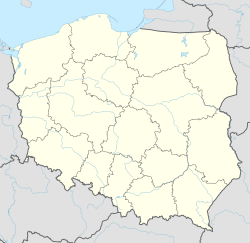Kargowa
Kargowa | |
|---|---|
 Town hall | |
| Coordinates: 52°4′N 15°52′E / 52.067°N 15.867°E | |
| Country | |
| Voivodeship | |
| County | Zielona Góra |
| Gmina | Kargowa |
| First mentioned | 14th century |
| Town rights | 1661 |
| Area | |
| • Total | 4.55 km2 (1.76 sq mi) |
| Population (2019-06-30[1]) | |
| • Total | 3,769 |
| • Density | 830/km2 (2,100/sq mi) |
| Time zone | UTC+1 (CET) |
| • Summer (DST) | UTC+2 (CEST) |
| Postal code | 66-120 |
| Area code | +48 68 |
| Vehicle registration | FZI |
| Climate | Cfb |
| Website | kargowa |
Kargowa [karˈɡɔva] (German: Unruhstadt) is a town in Zielona Góra County, Lubusz Voivodeship, in western Poland, with 3,769 inhabitants (2019).
Though located in the Lubusz Voivodeship, Kargowa is part of the Greater Poland historic region.
History
[edit]| Year | Pop. | ±% |
|---|---|---|
| 1810 | 1,805 | — |
| 1843 | 2,058 | +14.0% |
| 1871 | 1,959 | −4.8% |
| 1880 | 2,023 | +3.3% |
| 1890 | 1,724 | −14.8% |
| 1900 | 1,594 | −7.5% |
| 1910 | 1,500 | −5.9% |
| 1925 | 1,469 | −2.1% |
| 1939 | 1,713 | +16.6% |
| 1950 | 1,796 | +4.8% |
| 1960 | 2,425 | +35.0% |
| 2010 | 3,658 | +50.8% |
| Source: [2][3] | ||
Kargowa was first mentioned in writing in the 14th century. It was granted town rights by King John II Casimir Vasa in 1661.[4] In the 18th century, the kings Augustus II the Strong and Augustus III of Poland often visited the town during their travels between Warsaw and Dresden.[4] In the 18th century the town was the site of two battles. During the War of the Polish Succession, in 1735, a battle was fought between Poles and Saxons. During the Second Partition of Poland in 1793, Kargowa was one of the places of Polish resistance against Prussia and a defensive battle took place.[4][5]
After the successful Polish Greater Poland uprising of 1806, Kargowa was regained by the Poles and became part of the short-lived Polish Duchy of Warsaw. In 1815 it was annexed by Prussia for the second time. After Poland regained independence, Kargowa was captured by Polish insurgents in 1919; however, the Treaty of Versailles granted the town to Germany.
During the final stages of World War II in 1945, a German-perpetrated death march of Jewish women from a just dissolved subcamp of the Gross-Rosen concentration camp in Sława passed through the town.[6] The town finally returned to Poland after the defeat of Nazi Germany in World War II in 1945.
Notable people
[edit]- Karl von Hänisch, military general
- Maciej Kozłowski, actor
- Carl Gottfried Drange, one of Angela Merkel's maternal ancestors was a master miller here
Twin towns – sister cities
[edit]See twin towns of Gmina Kargowa.
Gallery
[edit]-
Town center
-
Monument to the Heroes of the Greater Poland uprising
-
Maximilian Kolbe church
-
Post office
References
[edit]- ^ "Population. Size and structure and vital statistics in Poland by territorial division in 2019. As of 30th June". stat.gov.pl. Statistics Poland. 2019-10-15. Retrieved 2020-04-11.
- ^ Dokumentacja Geograficzna (in Polish). Vol. 3/4. Warszawa: Instytut Geografii Polskiej Akademii Nauk. 1967. p. 19.
- ^ Stan i struktura ludności oraz ruch naturalny w przekroju terytorialnym w 2010 r. (PDF) (in Polish). Warszawa: Główny Urząd Statystyczny. 2011. p. 61. Archived from the original (PDF) on 13 November 2011.
- ^ a b c Słownik geograficzny Królestwa Polskiego i innych krajów słowiańskich, Tom III (in Polish). Warszawa. 1882. p. 839.
{{cite book}}: CS1 maint: location missing publisher (link) - ^ "Obrona ratusza w Kargowej". Region Wielkopolska (in Polish). Retrieved July 28, 2019.
- ^ Toczewski, Andrzej (2017). "Filie obozów koncentracyjnych na Środkowym Nadodrzu". Ziemia Lubuska (in Polish). 3. Zielona Góra: 126. ISSN 2450-3355.
External links
[edit]- Jewish Community in Kargowa on Virtual Shtetl








